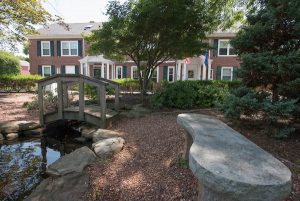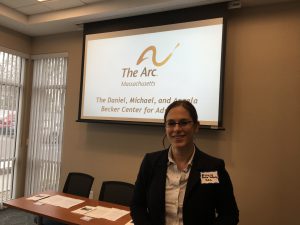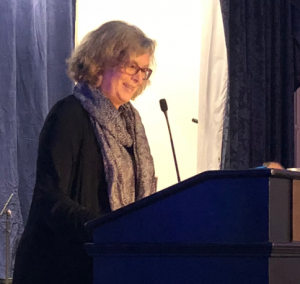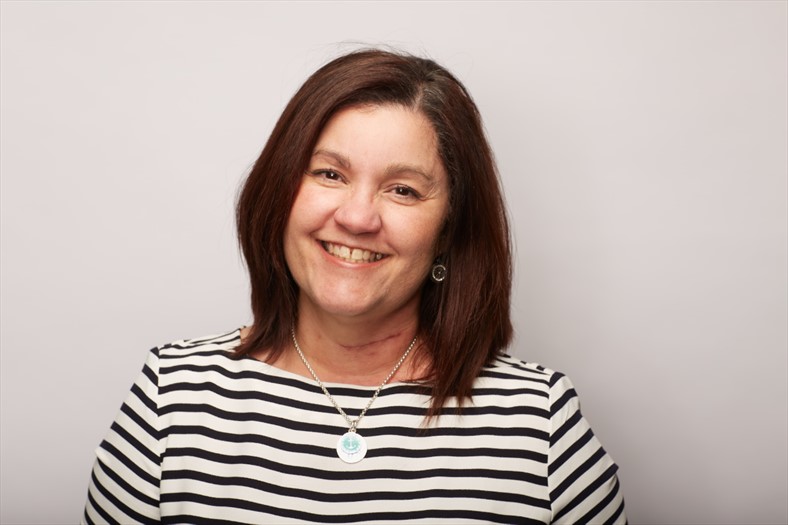Host, Walter Noons, is joined by DLC’s new Executive Director, Marlene Sallo. Marlene talks about her background, what brought her to DLC, and her vision for the organization.
Massachusetts Protection and Advocacy

BOSTON, April 11, 2018 – The Disability Law Center (DLC) issues a Report today announcing the results of its abuse and neglect investigation at Meadowridge Academy (Meadowridge) in Swansea, Massachusetts. DLC substantiated abuse and neglect at Meadowridge, but also found it has comprehensively remedied the abuse and neglect concerns.
Meadowridge is a private, residential special education school, which is a part of the Justice Resource Institute (JRI) network, and approved by the Massachusetts Department of Elementary and Secondary Education. Meadowridge serves as a placement for up to 36 students with significant mental health issues, behavioral difficulties and complex trauma histories.
During the winter of 2016, DLC received complaints regarding the treatment of students at Meadowridge. As part of its investigation, DLC reviewed records from Meadowridge, multiple state oversight agencies and local police. DLC also interviewed families, conducted two site visits and interviewed the Director of Meadowridge and JRI staff.
DLC’s investigation substantiated abuse and neglect against students with disabilities from 2014 through 2016. Specifically, in 2015, one residential supervisor abused a 17-year old student by engaging in a sexual relationship with her. Additionally, from January 2014 to October 2016, DLC found several staff members engaged in sexually inappropriate behavior with students. All employees involved in any misconduct were terminated or resigned. DLC also found Meadowridge neglected students by failing to provide a safe environment (e.g. 142 police incidents at Meadowridge from 2014-2016, including peer-on-peer assaults and runaways).
DLC also found Meadowridge has engaged in extensive corrective action measures to prevent further harm to students with disabilities. For example:
These changes have decreased runaways dramatically and eliminated staff boundary violations at Meadowridge. Due to the proactive and broad nature of Meadowridge’s remediation, DLC does not seek any additional remedies, but will continue to monitor the school for compliance.
“The misconduct at Meadowridge was egregious” says Marlene Sallo, DLC’s Executive Director. “However, we commend Meadowridge for assessing every aspect of their operation and engaging in thoughtful and effective corrective action at every level.”
Contact: Stanley J. Eichner, Litigation Director
617-723-8455
From a wheelchair, Lowell man’s a force for accessibility
Lowell Sun
But it will never have enough resources to ensure that every public and private facility is in compliance, said Stan Eichner, director of litigation for the Disability Law Center. “It’s one of the reasons that private lawsuits have been necessary to get people’s attention — because there’s no agency that’s …
The Commonwealth developed its first Olmstead Plan in 2008 and has recently been in the process of tracking its progress and developing an updated plan – the Draft Massachusetts Olmstead Plan 2018.
The committee which is currently drafting the Commonwealth’s new Olmstead Plan, has provided a deadline of next Friday, April 13, 2018 for comments.
Here at DLC, we have been providing comments during the process. Attached you can find our latest memo outlining our concerns on all issues.
If you would like to see much needed change in these areas as well, I encourage you to review the draft plan and submit comments by next week’s deadline of April 13, 2018. Additionally, if you can send this information to any of your contacts who might share our concerns, please feel free to do so.
Below are the links to where you can find the Draft Plan as well as the questions for comment.
Stakeholder engagement form
March 14, 2018 draft of the state’s Olmstead Plan

The Becker Family Trust, in conjunction with the Becker Center for Advocacy at the Arc of Massachusetts, announced grant awards this morning, including a grant to the Disability Law Center for advocacy to bring community integration to day habilitation programs. The work will last over a span of two years.
DLC is grateful to the Becker Family Trust for its generous support of this innovative project. We look forward to working with the Arc of Massachusetts, providers, state agencies, a technical assistance provider, families, individuals, and advocates on strategies for providing meaningful community participation for day habilitation participants.
MEDIA ADVISORY: For Immediate Release
DATE: March 30, 2018
CONTACT:
Marlene Sallo
Executive Director
Disability Law Center
617 723-8455

DLC’s Linda Landry accepts the Marie Feltin Award at BCIL’s event last night. Congratulations Linda!
The award honors individuals and institutions who exemplify the pioneering spirit of the late DR. MARIE FELTIN, a tireless advocate for disabled and chronically ill patients. Marie was a founder of Boston’s Community Medical Group, East Boston Health Center’s Home Care Program and the Urban Medical Group, neighborhood healthcare services that focused on encouraging patients to become actively involved in their care as a critical means to bettering their health. Marie was always available for her patients and was a modern-day pioneer in providing medical care to society’s most neglected and vulnerable populations.
This year’s honorees are:

The REV UP Campaign is coordinating the third annual National Disability Voter Registration Week (NDVRW) to increase the political power of people with disabilities while also engaging candidates and the media to recognize the disability community. Our 2018 NDVRW Toolkit is in the works and will be available next month. In the meantime, check out www.aapd.com/NDVRW for some resources and ideas on how to get involved. Coming soon!
A candidate questionnaire is a great tool to help the disability community learn more about candidates, specifically how the candidates would address issues that impact people with disabilities. The REV UP Campaign will be releasing a Candidate Questionnaire Template to help state and local advocates develop their own candidate questionnaire. Coming soon!
The REV UP Campaign is developing an Issues Guide to concisely summarize and explain the most pressing issues affecting the disability community. The Guide will also highlight what elected officials can do. Coming soon!
The REV UP Campaign will be releasing an Election Accessibility Toolkit – a tool to assist disability advocacy organizations and individual advocates when working with voters and election officials. Coming soon!

Press Release
February 27, 2018
Disability Law Center Announces New Executive Director
The Disability Law Center, the Protection and Advocacy organization for Massachusetts, has announced the selection of Marlene Sallo, Esq., as its new executive director. Marlene will fill the vacancy created by the retirement of Christine Griffin. The selection was made after a national search and selection process.
“We are very pleased to make this announcement and welcome Marlene to the Law Center,” reported Joseph Ambash, Esq and Disability Law Center Board Chair. “Marlene will bring leadership and a breadth of legal and management experience to the Law Center with a deep sense of commitment to the disability community of Massachusetts.
Marlene Sallo has served as Chief of Staff and Senior Counsel for the U.S. Department of Justice Community Relations Service (CRS), the Nation’s “Peacemaker” for community conflicts and tensions arising from conflicts based on race, color, national origin, gender, gender identity, sexual orientation, religion and disability. Prior to assuming this role, Ms. Sallo was appointed by President Obama to serve as the Staff Director of the U.S. Commission on Civil Rights. While at the Commission, Ms. Sallo had the opportunity to direct several fact-finding public hearings and reports investigating civil rights violations based on gender, religion, national origin, or in the administration of justice. Ms. Sallo previously worked at UnidosUS, the nation’s largest Hispanic civil rights and advocacy organization, where she developed issue awareness campaigns to educate UnidosUS affiliates, state and federal government officials, and the public on national and state level policies and initiatives that disparately and/or disproportionately impact Latino youth.
Ms. Sallo has dedicated her career to protecting the rights of disenfranchised and vulnerable children through her work as a special education teacher and attorney specializing in child welfare, juvenile justice, and special education law. As a zealous advocate for children, she has challenged policies and practices within public school systems that push minority students with disabilities out of school and into the juvenile justice system. Ms. Sallo holds a Bachelor of Arts degree in Psychology from Manhattanville College and a Juris Doctorate degree from Florida State University College of Law. Ms. Sallo is also the recipient of an honorary Doctorate of Humane Letters degree from Manhattanville College.
Ms. Sallo serves as the Co-Chair of the American Bar Association’s (ABA) Section of Litigation, Children’s Rights Litigation Committee and previously served as both a Commissioner with the ABA’s Commission for Youth at Risk and as a member of the Florida Bar’s Standing Committee on the Legal Needs of Children.
“I look forward to this opportunity to serve the disability community in Massachusetts and partner with the area’s disability organizations as the new Executive Director of this well respected Law Center,” remarks Marlene. “As a woman with a disability and lawyer who has worked on disability rights and civil rights for many years, I am eager to work with the Law Center’s talented staff to provide the protection and advocacy this community deserves. The Disability Law Center plays a key role in improving the quality of life for individuals with disabilities in Massachusetts.”
Marlene will begin her new role as Executive Director on March 1, 2018.
MEDIA ADVISORY: For Immediate Release
DATE: February 27, 2018
CONTACT:
Joseph Ambash, Esq.
Chair, Governing Board
Disability Law Center
617 723-8455
February 22, 2018
Disability Law Center (DLC) finds the Massachusetts Department of Elementary and Secondary Education (ESE) data on school restraints extremely disturbing. In schools, restraints may only be utilized as a matter of last resort to prevent imminent, serious physical harm after less intrusive behavioral interventions have failed (or are deemed inappropriate under the circumstances). 603 C.M.R. § 46.03(1)(c). School staff must also review each restraint and patterns of restraints in order to develop appropriate, less intrusive interventions. See 603 C.M.R. § 46.06(4)-(6). Based on the self-reported school restraint data, it is evident that schools in the Commonwealth are engaging in frequent patterns of restraint with students. While DLC understands some student populations, due to their disabilities, are prone to repeated self-injurious and/or aggressive behaviors, this does not negate the schools’ responsibility to only use restraint as a matter of last resort and does not minimize its obligation to work diligently to find less intrusive and less dangerous interventions.
Moreover, DLC is particularly troubled by the high number of restraints on students in public schools (both traditional schools and charter schools) that do not traditionally serve students with extreme behavioral disability manifestations. DLC is committed to reviewing this data thoroughly and utilizing it to inform decisions about where to spend abuse and neglect monitoring and investigation efforts. DLC encourages parents whose children are experiencing frequent school restraints or sustain injuries from restraints to call our office at 617-723-8455.
Chris Griffin
Executive Director
Host, Walter Noons interviews Jamie Sabino, Staff Attorney at Massachusetts Law Reform Institute (MLRI) and Co-Manager of the Civil Legal Aid to Victims of Crime (CLAVC) Initiative. They discuss how persons who have been victims of crime may receive free legal assistance in civil matters, such as eviction, divorce, etc., when the civil matter arises from the crime.